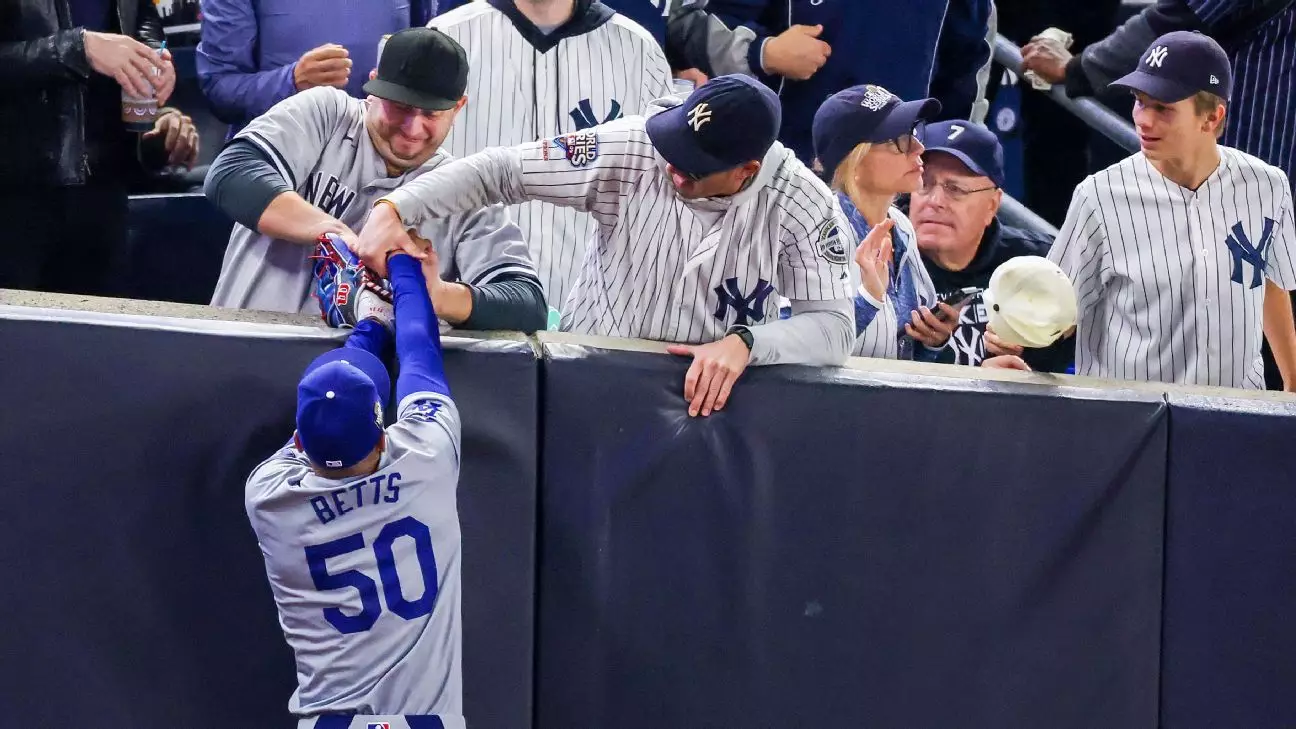In a gripping tale of passion clashing with sportsmanship, two devoted New York Yankees fans find themselves at the center of a controversy following their bizarre interference with Los Angeles Dodgers star Mookie Betts during Game 4 of the World Series. The incident highlights the fine line that exists in sports between zealous support and reckless behavior, raising pressing questions about player safety and the responsibility of fans.
During a crucial play in the first inning of the game, Betts, a key player for the Dodgers, made a remarkable leaping catch, only to find himself embroiled in an unusual confrontation. Season-ticket holders Austin Capobianco and John Peter took it upon themselves to reach into Betts’ glove to pry the baseball from his possession. This blatant disregard for the boundaries of respectful fandom led to immediate ejection from the stadium and has since resulted in a ban from attending not only the rest of the World Series but also potential future games.
The Yankees quickly issued a statement condemning the actions of the fans, labeling it as “egregious and unacceptable.” This response echoes a broader commitment by professional sports organizations to ensure that their venues remain safe sanctuaries for both players and spectators. It is abundantly clear that such behavior has no place in the realm of competitive sports, where the safety and integrity of the game must be upheld.
The aftermath for Capobianco and Peter has been significant. The Yankees not only barred them from attending Game 5 but went a step further by donating their tickets to a child battling illness and his family, which additionally demonstrates the team’s commitment to nurturing a positive atmosphere and supporting worthy causes. The choice to reallocate the tickets, thus turning a negative incident into a gesture of kindness, shows that the organization recognizes the moral imperative to offset the fans’ misconduct.
However, the specifics of the ban raised questions about its duration. While Capobianco expressed hopes for a “short-term ban,” the Yankees were not forthcoming about whether the ejection would affect their season ticket status in future seasons. Such uncertainty leaves fans questioning the repercussions of their actions in a highly charged environment like Yankee Stadium—an arena known as much for its intense energy as for its longstanding traditions.
Reactions to the incident have flowed in from various corners, including a statement from Tony Clark, executive director of the Major League Baseball Players Association (MLBPA). His remarks reinforcing the union’s dedication to player safety serve to underline a significant aspect of the issue: the necessity of rigorous protocols and measures to safeguard athletes amid the fervor of live sports.
Yankees manager Aaron Boone and left fielder Alex Verdugo also weighed in, reinforcing the idea that while enthusiasm is celebrated, crossing the line into aggression is inexcusable. Boone’s straightforward assertion—”Come here, cheer, root for your team, whatever. No place for that”—captures the feelings of many within the organization and beyond.
Verdugo’s comments, however, reflect a more ambivalent attitude toward the incident, suggesting that such behavior can be viewed as a byproduct of New York’s character. While there may be an element of uniqueness to the culture in New York, it does not condone antics that jeopardize players’ safety. The discussion surrounding this event emphasizes a critical turning point in the interactions between fans and players.
As this season’s baseball drama unfolds, the actions of a few fans serve as a sobering reminder of the responsibilities that come with fandom. The ability to passionately support a team should never overshadow the fundamental respect owed to the players on the field. This incident could pave the way for stricter regulations regarding fan conduct at games, ensuring that the spirit of the sport is maintained without compromising the safety of its participants.
Ultimately, sports evoke a spectrum of emotions ranging from excitement to fury. Yet, within this emotional landscape, the importance of respect must remain paramount. For both the fans who thrive on the atmosphere of live sporting events and the players who dedicate themselves to excellence, learning to navigate this balance will be essential for the preservation of the cherished traditions of America’s favorite pastime.


Leave a Reply